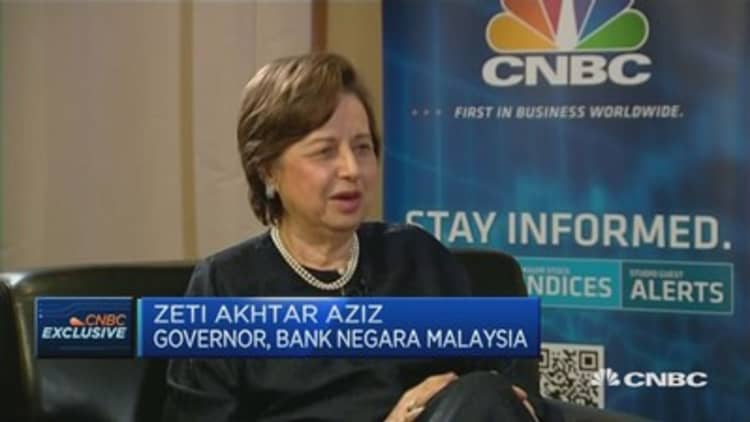
As Asia braces itself for a turbulent year driven by an economic slowdown in China and a slump in commodity prices, Malaysia has an additional headache to worry about: its international reputation.
Since last year, a state-owned investment fund, the 1Malaysia Development Berhad (1MDB), has been embroiled in one of Malaysia's worst political scandals that has left international investors wary. Malaysian authorities, including the central bank, have launched investigations, as have international bodies such as the FBI in the United States, into allegations of misappropriation of funds by 1MDB.
"Everyone wants a conclusion [to the investigations] so that can just move [on]," Zeti Akhtar Aziz, governor of Bank Negara Malaysia, told CNBC, adding there are other important economic issues the country is confronted with.
Speaking exclusively to CNBC Asia's Bernard Lo at the Asian Financial Forum in Hong Kong, Governor Zeti said the bank has completed its investigations. Enforcement actions are being finalized and "will be made known" to the public.
In July, the Wall Street Journal published a report alleging that nearly $700 million had flowed from the fund to Prime Minister Najib Razak's personal bank account. Najib has repeatedly denied wrong-doing and, under pressure from the WSJ report, said the funds were a private donation from a Middle Eastern country he declined to name.
Last December, the WSJ expanded on its allegations by reporting that hundreds of millions worth of unreported political spending flowed from public source or programs intended for other purposes, including at least $140 million that was spent on charity projects to boost the chances of PM Najib's political party to win the 2013 election.
Other economic issues facing Malaysia include slower growth and a weaker currency. Barclays last week forecast Malaysia's economic growth to moderate from an expected 5 percent in 2015 to 4.7 percent in 2016.
"We expect domestic demand to moderate going forward, as private consumption and private investment are expected to be weaker in 2016," said Barclays analyst Rahul Bajoria in a research note.
HSBC has an even more conservative estimate for 2016 growth; the bank forecasts Malaysia's full year growth to be at 3.6 percent.
The Malaysian ringgit was one of the hardest hit Asian currencies in early parts of 2015, owing to lower oil prices as well as the strengthening of the dollar in the buildup to the U.S. Federal Reserve's rate hike in December. Malaysia is an oil exporter, with key exports including crude petroleum, LNG, and palm oil, and perception of its economy typically sway in tandem with commodity markets.
The dollar-ringgit pair was up 22.74 percent in 2015 as investors moved away from riskier Malaysian assets to stable dollar-denominated assets. The ringgit recovered modestly in the final few months of the year and maintained some stability since then.
As developments in China loom over the growth prospects of Asian economies in 2016, Governor Zeti, who steered Malaysia's central bank through the 2008 global financial crisis, said the People's Bank of China [PBOC] could have handled some of its recent market policies better as the economy undergoes a rebalancing.
But she said Beijing's intervention in capital markets to stem the massive sell-off which began in the middle of last year was the right thing to do. "The objective of [PBOC's] measures was to restore civility in the financial markets," she said, adding that in the aftermath of the Asian Financial Crisis, Malaysia also had to intervene in its market to "reign in excess credit growth."
"I think there's overreaction by the markets on some of these developments [in China]," she added.
Watch the full CNBC Conversation with Zeti Akhtar Aziz on January 22 at 6.30pm SIN/HK.







